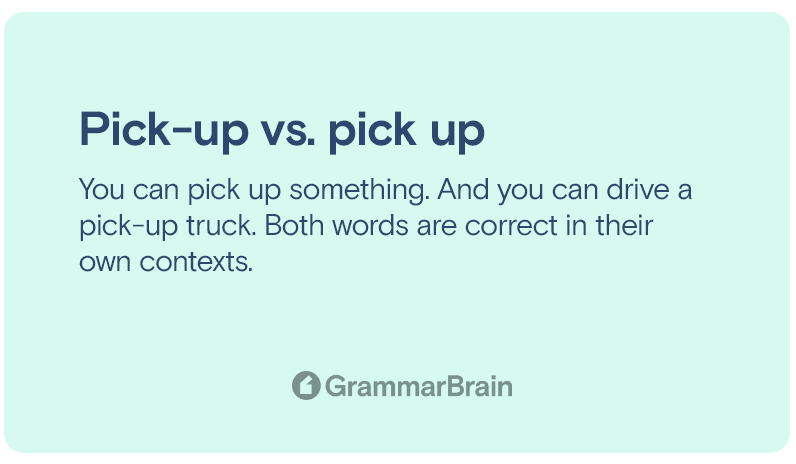Want to learn more about “pick up” and “pickup”? You are in the right place. Although the terms have similar meanings, they are not interchangeable. Here, we will explain the difference between “pick up” and “pickup” and provide samples on how to use them. You will additionally know how to use each term in a sentence appropriately.
What is the difference between pick up and pickup?
Pickup and pick up are frequently used interchangeably, but their meaning is slightly different. The difference between pick up and pickup is that pickup typically refers to the act of picking something up, as in, “Can you please pickup my dry cleaning on your way home?”
In this case, pickup is used as a verb. In evaluation, pick up is more commonly used as an adjective or adverb, as in “We need to pick up some milk on the way home.” Here, pick up is modifying the word milk.

When do you use to pick up, and when do you use pickup?
Let us know when to use a pickup, the word “pickup” can be used a noun or a verb. However, the spelling varies depending on the context.
As a noun, “pickup” refers to a small truck with an open bed. In this sense, it is usually spelled as one word.
The verb form of “pickup,” on the other hand, typically refers to the act of picking something up. In this context, you can spell it as two terms. It is essential to note that there are exceptions to these kinds general rules.
For example, Pick Up Artist is a common word for someone who is skilled at flirting and picking up potential partners.
In this case, the word “pickup” is spelled as one word regardless of its function in the phrase. Ultimately, whether you spell “pickup” as one word or two will depend on the specific context in which you are using it.
How can you remember which one to use between pick up or pickup?
There is a trick to help you remember which spelling to use. If you can remember that the one-word spelling, pick up, has a meaning that is unrelated to the act of lifting something.
You should be able to remember to use it when referring to the act of lifting something.
The same goes for the two-word spelling, pickup. If you can remember that the meaning of the two
words together is related to lifting something. Then you should be able to use it when referring to the act of lifting something.
Of course, there are always exceptions to rules, and there are some examples in which either spelling could be correct. However, if you can keep this simple trick in mind, you should be able to spell pickups and pick ups correctly most of the time.
Examples of pick up and pickup in sentences
A few examples of pick up and pickup are when pick up is used as a noun. It refers to a truck with an open bed.
For example, you might say, “I’m going to need a bigger pickup to haul all this mulch.” When used as a verb, it typically means to gather or collect something. For example, you might say, “I need to pick up some milk on the way home.”
The word “pick up” can also be used as a verb, but it has a different meaning. In this case, it means to improve or increase.
For example, you might say “Sales have been picking up since we launched our new marketing campaign.” It can also mean lifting something or someone up.
For example, you might say “Can you pick up that box for me?”
As you can see, the words “pickup” and “pick up” can have distinct meanings depending on how they are used. Keep this in mind when using these in your own writing.
Conclusion
Do you need to pick something up? Make sure you know the right word to use. Whether you are picking something up at the store or requesting a pickup from a friend, it’s important to use the correct phrasing.
In this blog post, we’ve outlined the differences between pick up and pickup in English. We hope this information helps you communicate effectively and improves your understanding of English vocabulary.
Inside this article
Fact checked:
Content is rigorously reviewed by a team of qualified and experienced fact checkers. Fact checkers review articles for factual accuracy, relevance, and timeliness. Learn more.
Core lessons
Glossary
- Abstract Noun
- Accusative Case
- Anecdote
- Antonym
- Active Sentence
- Adverb
- Adjective
- Allegory
- Alliteration
- Adjective Clause
- Adjective Phrase
- Ampersand
- Anastrophe
- Adverbial Clause
- Appositive Phrase
- Clause
- Compound Adjective
- Complex Sentence
- Compound Words
- Compound Predicate
- Common Noun
- Comparative Adjective
- Comparative and Superlative
- Compound Noun
- Compound Subject
- Compound Sentence
- Copular Verb
- Collective Noun
- Colloquialism
- Conciseness
- Consonance
- Conditional
- Concrete Noun
- Conjunction
- Conjugation
- Conditional Sentence
- Comma Splice
- Correlative Conjunction
- Coordinating Conjunction
- Coordinate Adjective
- Cumulative Adjective
- Dative Case
- Determiner
- Declarative Sentence
- Declarative Statement
- Direct Object Pronoun
- Direct Object
- Diction
- Diphthong
- Dangling Modifier
- Demonstrative Pronoun
- Demonstrative Adjective
- Direct Characterization
- Definite Article
- Doublespeak
- False Dilemma Fallacy
- Future Perfect Progressive
- Future Simple
- Future Perfect Continuous
- Future Perfect
- First Conditional
- Irregular Adjective
- Irregular Verb
- Imperative Sentence
- Indefinite Article
- Intransitive Verb
- Introductory Phrase
- Indefinite Pronoun
- Indirect Characterization
- Interrogative Sentence
- Intensive Pronoun
- Inanimate Object
- Indefinite Tense
- Infinitive Phrase
- Interjection
- Intensifier
- Infinitive
- Indicative Mood
- Participle
- Parallelism
- Prepositional Phrase
- Past Simple Tense
- Past Continuous Tense
- Past Perfect Tense
- Past Progressive Tense
- Present Simple Tense
- Present Perfect Tense
- Personal Pronoun
- Personification
- Persuasive Writing
- Parallel Structure
- Phrasal Verb
- Predicate Adjective
- Predicate Nominative
- Phonetic Language
- Plural Noun
- Punctuation
- Punctuation Marks
- Preposition
- Preposition of Place
- Parts of Speech
- Possessive Adjective
- Possessive Determiner
- Possessive Case
- Possessive Noun
- Proper Adjective
- Proper Noun
- Present Participle
- Prefix
- Predicate



